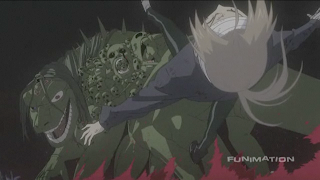Ani-Gamers blogger Ink contributes a weekly column in which he examines the differences between the original Fullmetal Alchemist and its re-telling, Fullmetal Alchemist: Brotherhood. To read previous entries, click here.
“Excels in action” would definitely be the credo behind FMA2’s animation and plot, but that does not mean this series is devoid of emotion. Instead, the action tends to wring out some degrees of unpleasantness FMA1 could never have due to its own areas of focus. I’m talking specifically about Ed’s unwillingness to kill.
In FMA1, Ed’s first act of murder was enticed through a battle with Greed, but FMA2 has Ed retain his innocence by allowing him to not kill (Greed was diced up by Wrath and smelted by “Father”). Thus, when Ed is confronted by the howling souls bubbling up from Envy’s skin like so many riotous zits, the emotional impact of not wanting to kill something issuing a voice smacking of human resonance is brought to the forefront along with the danger involved in his hesitation to strike. Thus FMA2 very nicely combines a level anxiety, fear, and concern in this battle with Envy which is on par with but parallel to the emotional trauma FMA1 writers inflicted on Ed with what now seems a Slothy sucker-punch. It also exceeds FMA1’s last-minute “I was your brother” attempt at an emotional uppercut in the last battle of that series.
It is during Fuhrer King Bradley’s back story, which again does nothing to humanize the homunculus, that there arises something not so much entirely different from FMA1 than supplementary. FMA1 had Dante explain how Bradley was her most prized accomplishment – a homunculus that could age like a human. How she did this, however, was never explained. FMA2 delivers a back story that shows a Hitler Youth-style program that bred potential Fuhrers who would, for lack of a better term, be used as a homunculus host. This is a defining aspect between the series, as it illustrates the views on humanity. FMA1 turned soul-less, living human meat into the equivalent of Hollows from Bleach (wretched apparitions seeking constant vengeance to regain a humanity lost), while FMA2 creates creatures that develop into their own proud, super-human form.
Slightly less all-important, but still of note is the fact that FMA2’s Ed learns of “Father’s” involvement in the disappearance of the city of Xerxes via the same deductive reasoning offered up in FMA1 for the disappearance of entire cities/civilizations but before he knows who “Father” is. FMA1 used that setup to bring about emotional conflict that served the series well later on, so what will this information do to FMA2’s Ed, who’s just about to pop out of Gluttony’s stomach and into the den of homunculi? I can’t wait to see the action.
Finally, FMA2 delivers a last minute “AWESOME!” in defying FMA1’s inter-gate/door-of-truth experience. Remember how Ed could never figure out the state of Al’s body? Ladies, get ready for some fan service, because they call it the naked truth for a reason. This could be a slightly skewed version of what happened in FMA1’s last episode where Ed sacrifices himself to bring back Al), but it takes a different route (post-sacrifice) with Al not being brought back and Ed being sucked back into the same world (as opposed to a pre-WWII Europe).

